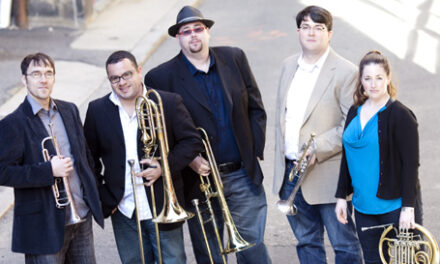On Broadway, on tour at Belk Theater, and on stage in a local Actor’s Theatre production, a couple of things have stood out vividly each time I’ve seen The Curious Incident of the Dog in the Night-Time. With projections that show stark grids, night-time starscapes, flying dogs, an animated map of the London Underground, and a mathematical proof, Curious Incident proved on each occasion to be technically dazzling for a straight play based on a working-class novel by Mark Haddon. No less memorable is the performance demanded by playwright Simon Stephens of the actor who portrays Christopher Boone, an autistic 15-year-old boy who solves two mysteries, confronts a challenging state math exam, and writes a book as he begins a painful and laborious process of coping with his multitudinous fears and aversions – noise, being touched, eye contact, and socializing for starters.
So it was with a mixture of fascination and trepidation that I drove up I-77 to Davidson on a snowy night to see how a community theatre would meet the steep technical and acting challenges of the 2015 TONY Award winner for Best Play. Defying apocalyptic predictions from TV anchorpersons and weather bulletins – multiple inches of snow accumulating tonight! icy roads in the morning! – a hardy crowd filled Armour Street Theatre to capacity on opening night of this Davidson Community Players presentation.
If you had seen any Broadway or Belk Theater production before, just a glance inside the Armour Street facility would be sufficient to curb expectations. Yet the video design by Caleb Sigmon, along with his busy, imaginative stage direction, were among the most pleasant surprises of this truly satisfying evening. To begin with, we don’t walk in on the sight of Wellington, Mrs. Shears’ dead dog, with a pitchfork horrifically planted in his side, the mystery Christopher is compelled to solve. Nor would animations be a great strength in Sigmon’s design: we all held our breaths during the promised post-show mathematical proof. But there were resourceful substitutions along our way, such as the black-and-white movie that sped us along the subway rails, filling the Armour stage and bleeding over onto the walls.
Scurrying around the cramped stage to replicate the hubbub of London, or rearranging the humble set pieces by designer Paul Swanson between scenes, the ten actors in Sigmon’s cast occasionally seemed to be on a treacherous collision course amid the commotion. Sightlines weren’t ideal when Christopher was writhing on the floor, overcome by his ferocious fears, and I’m not sure everyone very far from an aisle seat enjoyed as much as I did the episode when Christopher frantically chased after Toby, his pet rat, down on the rails at a London Underground station. For some of us, it was fortuitous that it’s just a short jump from the Armour Street stage to the center aisle.
Although he has himself performed major British roles quite capably at Children’s Theatre, in Mary Poppins and Matilda, Sigmon wisely steers his cast clear of voyaging across the ocean in their quests for authentic speaking. That levels the playing field for actors with varying amounts of training and proficiency – and likely helps some of DCP’s loyal subscriber base. Some of that variance will still be obvious to seasoned theatergoers, but with Matthew Howie as Christopher, bumps on the road from the supporting players won’t spoil the ride. After a successful Charlotte debut last October as Seymour in Little Shop of Horrors, capped by a Clark Kent flowering in “Suddenly Seymour,” Howie takes on an even more timorous protagonist here. Each of Christopher’s meltdowns is undeniably electric, yet over the course of the full evening, less sameness in reactions and loudness would make Howie’s intense, powerful performance even finer.
As Christopher’s father, Ed Boone, Alan Martin excels at showing us dad’s lack of understanding – of his son’s needs and his obsessiveness – even without the help of a working-class accent. Less vivid is the temperament of the man, his bottled-up and unexplained anger, and thus his full fearsomeness in Christopher’s eyes. We must gloss over Martin’s seeming incapability of doing the horrid things Ed actually has done, all of which should be seething under his façade. Rebecca Moellendick-Sayler was closer to what I expected to see in Judy Boone, Christopher’s runaway mom. It was more often a strain to hear Moellendick-Sayler than to imagine a sufficient mother-son age gap between her and Howie. Some of the most crucial lost dialogue occurred when she was voicing a letter written to Christopher from her London flat, perhaps because Sigmon has placed her so close to Howie’s right ear that she feared blowing out his eardrum.
Notwithstanding Judy’s feelings of inadequacy, Ed’s anger control issues, and Christopher’s epic catalogue of fears, what continued to make the Boone family so compelling was their earnest attempts to be better people, to overcome their personal problems, and perhaps even to reunite as a family. None of the technical shortfalls or acting imperfections noted here keep the Boones’ big wave of common yearning from hitting shore. Haddon and Stephens don’t reunite the family at the end, but Christopher’s taking his test and finishing his book are milestones they can celebrate collectively.
Of course, it’s Christopher’s teacher, Siobahn, who sets her bright pupil on the path of writing his book and becoming its protagonist, so we shouldn’t underestimate her role in making it all happen. Among the leading players, Debra Dean Allebach’s performance as Siobahn was the most consistent and serene. Allebach also serves as our narrator from time to time, reading from Christopher’s work-in-progress, and she arguably participates in the most comical dialogue of the evening, when she suggests that Christopher turn his book into a play.
Sly sleuthing and previous exposure enabled me to fairly well sort out who played whom among the players identified as Voices #1 to #6 in the playbill. Pam Coble Coffman was the most familiar to anyone who follows the Charlotte scene, and her chief role as Mrs. Alexander, the neighbor who offers Christopher cookies and info on his mom, was the most consistent delight. We certainly cannot do without Mrs. Shears, the neighbor whose murdered dog triggers Christopher’s odyssey, sternly delivered by Della Knowles. The other memorable Voice was Max Prascak in his belated theatrical debut, giving the adulterous Mr. Shears a wonderfully rawboned vulgarity.
Equally wondrous, I-77 was almost completely dry on our drive home. Fake weather!
The Curious Incident of the Dog in the Night-Time continues through Sunday, March 8. For more details on this production, please view the sidebar.












